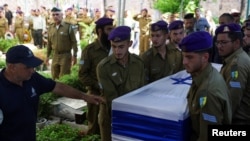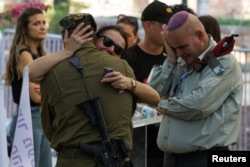Israeli officials Thursday offered details of how they recovered the bodies of five hostages killed during the October Hamas attack on Israel, while Israel's military continued its offensive in Gaza.
At a news conference in Tel Aviv, military spokesperson Rear Admiral Daniel Hagari said the bodies of the hostages had been held by Hamas in tunnels 20 meters beneath the streets of the southern city of Khan Younis.
He said the bodies were found Wednesday underneath an area that was previously designated as a humanitarian area by the Israeli military.
"An area for Gazan civilians to move away from the battlefield and receive humanitarian aid and shelter," Hagari said. "Hamas exploited the humanitarian area and used it to hold our hostages captive."
The Israeli military identified one hostage as Maya Goren, who was killed at Kibbutz Nir Oz in southern Israel. The other four hostages were Israeli soldiers killed in combat during the October attack, the military said. They were identified as Sgt. Oren Goldin, Staff Sgt. Tomer Ahimas, Sgt. Maj. Ravid Aryeh Katz and Sgt. Kiril Brodski.
Hamas killed about 1,200 people and took 250 others hostage during the October 7 attack. About 110 hostages are still being held in Gaza, and Israeli authorities have said about one-third of them are believed to be dead.
Israel's counteroffensive in Gaza has killed more than 39,100 Palestinians as of Thursday, according to the territory's Health Ministry, which does not distinguish between combatants and civilians in its tally. In May, Israel estimated the death toll at around 30,000, and that most of the dead are combatants.
Reports from Gaza indicate the Israeli offensive continued Thursday with strikes on Khan Younis and Rafah in the south. An Associated Press correspondent counted seven Palestinian deaths in Khan Younis. Agence France-Presse reported machine gun and tank fire in Gaza City to the north.
Netanyahu visit
Meanwhile, Israeli Prime Minister Benjamin Netanyahu met Thursday with President Joe Biden at the White House, where the two leaders were to try to close the final gaps in the Gaza cease-fire deal the Biden administration has been pushing for weeks.
Months of negotiations brokered by the United States, Egypt and Qatar have not been able to secure an agreement on a cease-fire proposal that would include the release of hostages from Gaza as well as Israel freeing some Palestinian prisoners and a surge of humanitarian aid into Gaza.
"I think the message from the American side in that meeting will be that we need to get this deal over the line," U.S. State Department spokesperson Matt Miller said Thursday.
But as negotiators from Egypt, Israel, the U.S. and Qatar were scheduled to meet Thursday in Doha to resume talks for a proposed three-phase cease-fire deal, Israel announced its negotiators were delayed and that talks now will not resume until next week.
Jonathan Dekel-Chen, the father of Israeli American hostage Sagui Dekel-Chen, expressed concern to VOA about the threat of a broader regional conflict.
"The world — and not just President Biden and Prime Minister Netanyahu — need[s] to commit to doing all that's necessary to get this done, and that starts, first and foremost, with [the] return of hostages, a cease-fire that can hold in Gaza and thereby prevent what could be a massive explosion," Dekel-Chen told VOA.
"Right now, it's a minor miracle that a wider, regional conflict has not yet exploded," he added.
U.S. Vice President Kamala Harris also met with Netanyahu on Thursday. Afterward she told reporters that she raised her concerns about the humanitarian crisis in Gaza.
"Israel has a right to defend itself. And how it does so matters," Harris told reporters after the meeting.
"I made clear my serious concern about the dire humanitarian situation there," she added. "I will not be silent."
Netanyahu earlier this week indicated there may be a breakthrough coming in the talks that would halt fighting and release all remaining hostages. But during his speech before the U.S. Congress on Wednesday, he vowed to press forward with Israel's war until he achieves "total victory."
As for his vision of a post-war Gaza, Netanyahu said he hopes for a demilitarized and deradicalized Gaza where a new generation of Palestinians can "live in peace with us." But in the meantime, he said, Israel must retain "overriding security control." He made no mention of an independent homeland for Palestinians.
The top U.S. general on Thursday said Israel still has not shared much of its "day after" planning for Gaza once the war with Hamas concludes.
"There's not a lot of detail that I've been able to see from a plan from them," Air Force General C.Q. Brown, chairman of the Joint Chiefs of Staff, told a Pentagon news conference. "This is something that we'll continue to work with them on."
During a briefing in New York, United Nations Secretary-General Antonio Guterres said Netanyahu's speech offered nothing new.
"So, there is nothing that was said that deserves comment," Guterres said. "And obviously, we absolutely must keep the two-state solution as the only possible long-term solution for peace in the region, independently of whatever is said by whoever, wherever."
VOA's Celia Mendoza contributed to this report. Some information for this report came from The Associated Press, Agence France-Presse and Reuters.






